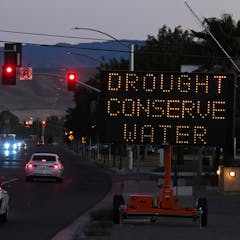
Articles on Environmental economics
Displaying 1 - 20 of 24 articles

A comprehensive review of research into the economic consequences of controversial water buybacks in the Murray-Darling Basin reveals many studies are of poor quality. Better standards are needed.

After almost half a century, the United Nations has waded back into the murky world of water policy. But one of the ideas following this year’s international meeting has been shot down.

Even after January’s storms, California faces a water-scarce future. An economist and an engineer propose a way to test higher water prices as a conservation strategy without hurting low-income users.

With a square and a circle, the father of ecological economics and a founding architect of sustainable development redrew our understanding of the economy. It was revolutionary.

Radical new thinking is required to fight climate change, and ‘gross ecosystem product’ might help.

After more than 300 years of effort, scientists have documented fewer than one-third of Australia’s species. The remaining 70% are unknown, and essentially invisible, to science.

People both for and against pricing biodiversity need to work together to protect the natural world.

Changing climatic conditions and ecological hazards are an important migration driver in sub-Saharan Africa.

Conservatives worldwide favor carbon pricing, cap-and-trade systems and other innovative environmental plans – just not in the United States.

July 29, 2019 is ‘Earth Overshoot Day,’ a date coined by the nonprofit Global Footprint Network to publicize overuse of Earth’s resources. But their estimates may actually understate the problem.

George H.W. Bush, who pledged to be ‘the environmental president,’ took a market-based approach to pollution control that helped clear the air. Now some experts think it could work on climate change.

August 1, 2018 is ‘Earth Overshoot Day,’ a date coined by the nonprofit Global Footprint Network to publicize overuse of Earth’s resources. But their estimates actually understate the problem.

What would you pay to keep trash off your favorite beach, or pollution away from a national park? Economists can tease these values out of our travel choices and use the numbers to help make policy.

Environmentalists and climate hawks are cheering, but many experts aren’t excited about the state making rooftop solar panels mandatory on most new homes beginning in 2020.

A full valuation of the Great Barrier Reef leads to a number so high it is essentially not worth considering in economic terms.

To weigh the economic impact of climate change policies, we need to estimate the social cost of carbon. An economist explains how it’s done and why the Trump administration shouldn’t end the practice.

New Zealand’s economically driven approach to ecological decline risks entrenching environmental problems rather than solving them.

Offshore drilling debates boil down to “Drill, baby, drill” versus “spill, baby, spill.” But economists say the right question is when we know enough to drill safely – and often that means waiting.

Two visions of the ‘new economy’, one based on environmental and social justice values, the other on disruptive technologies, are coming together to challenge the status quo.

A lifestyle based on aggressive consumption stresses the Earth’s resources and, beyond a certain point of comfort, does not actually foster human fulfillment or happiness.
